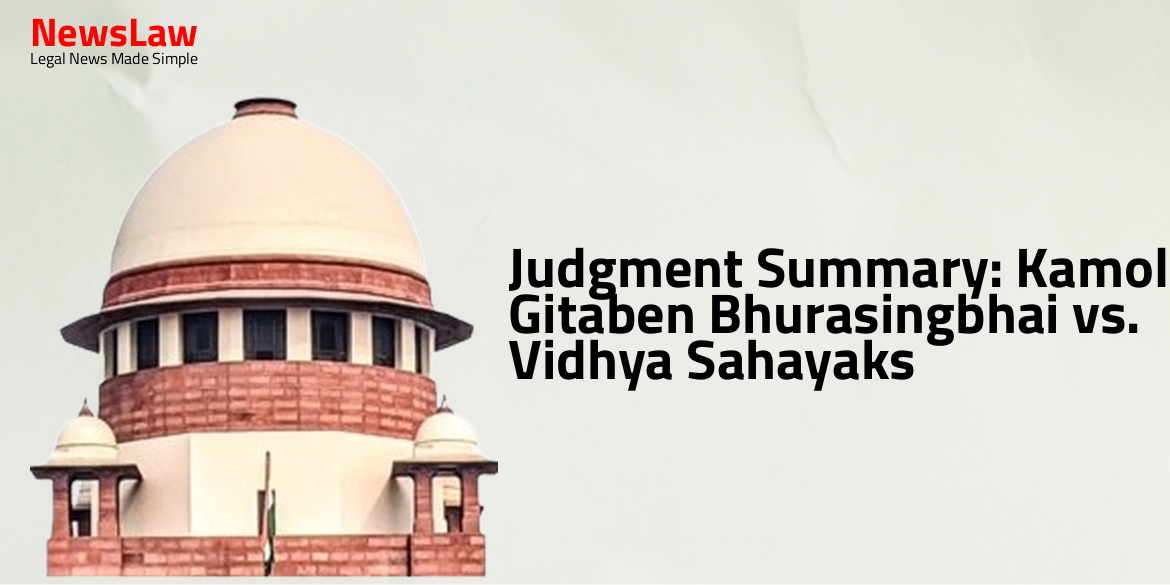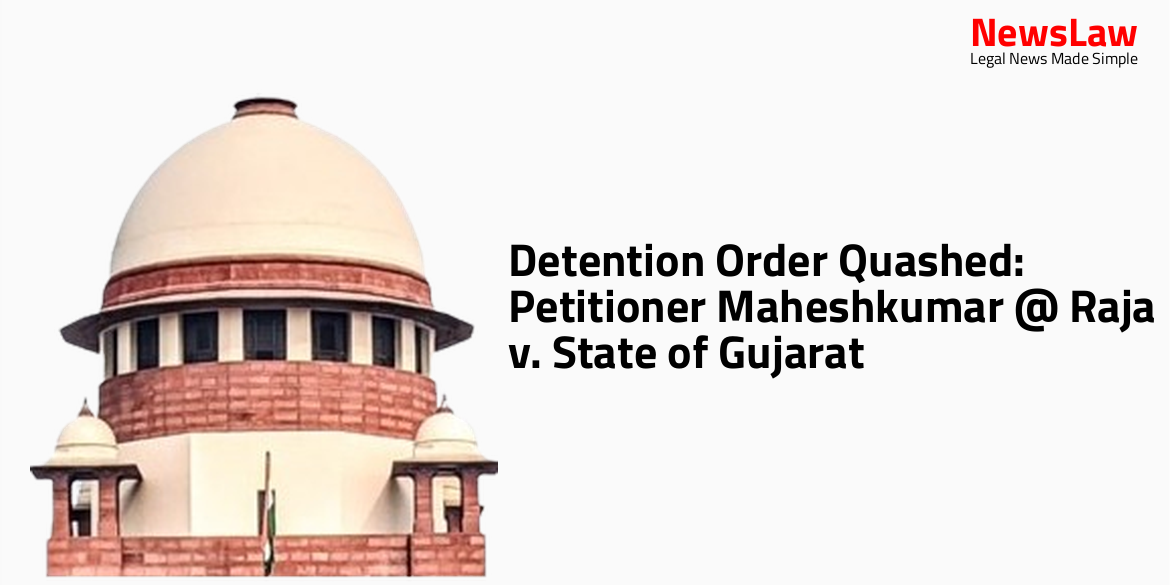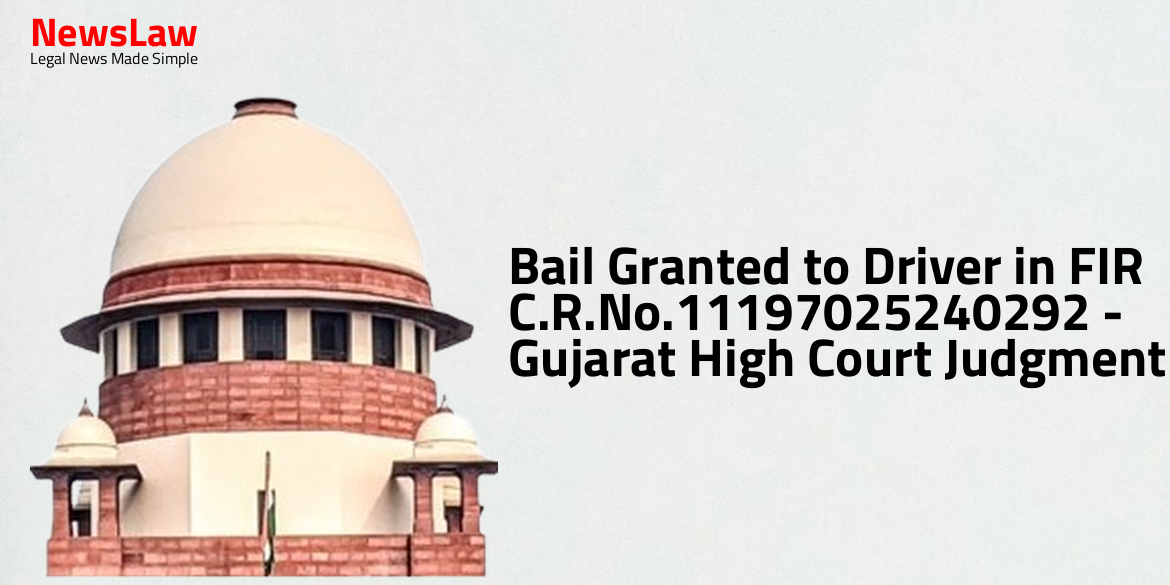In a recent ruling by the Gujarat High Court, the case of Kamol Gitaben Bhurasingbhai vs. Vidhya Sahayaks was addressed. The judgement shed light on key aspects of the dispute between the parties involved. Stay tuned to learn more about this significant legal development.
Facts
- The petitioners filed an RTI application in 2016 after a period of inactivity.
- The writ petition was filed in 2023 after receiving information.
- The present appeal is filed under Clause 15 of the Letters Patent Act, 1865 against the judgement of 01.01.2024.
- The learned Single Judge rejected the writ petition in Special Civil Application No.21710 of 2023.
- Petitioners did not include Kamol Gitaben Bhurasingbhai as a party respondent in the cause list.
- Petitioner No.1 was placed at Sr.No.416, Petitioner No.2 at Sr.No.422, and Kamol Gitaben Bhurasingbhai at Sr.No.430 with lesser marks but appointed.
Arguments
- The learned Single Judge in the writ petition has observed that the argument by the petitioner regarding a continuous wrong does not merit any consideration.
- The petitioner’s grievance does not constitute a continuous wrong according to the learned advocate for the petitioner.
- The learned Advocate’s submission on the continuous wrong aspect was dismissed by the Single Judge.
Analysis
- Delay in filing a petition can result in rejection or restriction of relief granted.
- Reopening an issue that would affect settled rights of third parties will not be entertained unless there is an exception.
- In cases related to payment, refixation of pay or pension, relief may be granted despite delay as it does not affect rights of third parties.
- Unexplained delay coupled with creation of third party rights is an important factor considered by the High Court when deciding to exercise jurisdiction in writ petitions.
- Relief can be granted even with a long delay if the claim is based on a continuing wrong, creating a continuing source of injury.
- Wrongful acts that continue to cause injury constitute a continuing wrong.
- In issues related to seniority or promotion affecting others, delay renders the claim stale and doctrine of laches/limitation is applied.
- Pension claims have a continuing cause of action on a monthly basis.
- The petitioners in this case do not have a continuing wrong as the alleged wrongful act was complete upon their non-appointment.
- The prayer clause for recovery of arrears for a past period in the writ petition follows principles related to recurring/successive wrongs.
- The appellants sought a writ of mandamus to be appointed as Vidhya Sahayaks based on a selection list published in 2007.
- The appellants failed to disclose the actual date of the selection list publication.
- The learned advocate confirmed that the selection list was indeed published in 2007.
- The writ petition was rejected by the learned Single Judge citing delay and laches as grounds.
- The advertisement for Vidhya Sahayak backlog vacancies was published on 25.01.2007, with the selection process on 12.03.2007.
- One of the exceptions to the rule of rejecting belated service-related claims is cases relating to a continuing wrong.
- The concept of a continuing wrong was explained in the case of Union of India and Others v. Tarsem Singh.
- The High Court does not usually allow belated resort to the extraordinary remedy of writ jurisdiction to prevent confusion, inconvenience, and injustice to third parties.
- A ‘continuing wrong’ refers to a single wrongful act that causes continuing injury.
- Recurring/successive wrongs are those that occur periodically, each giving rise to a distinct cause of action.
- No infirmity or illegality found in the judgement and order passed by the learned Single Judge in the writ petition.
- Non-appointment/non-selection of a person who participated in the selection process in 2007 cannot be questioned at this stage.
- The issue of appointment/selection could lead to complications such as seniority, promotion, etc.
Decision
- The appeal is rejected
- The present appeal has failed
Case Title: CHARPOT SHAILESHBHAI PARSINGBHAI Vs. STATE OF GUJARAT
Case Number: R/LPA/547/2024



